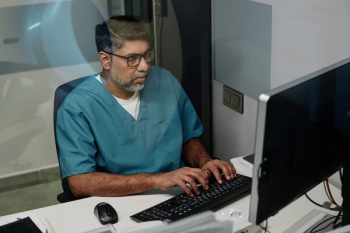
It’s the Little Things that Sound Sincere
Is there a way to add a little more sincerity to the day-to-day?
One of the various wrinkles of moving from work as part of a massive, nation-wide
Neurotic that I am, whenever I receive a piece of mail from a hospital, insurer, State medical board, etc., my mind goes to Yellow Alert. Uh-oh, what’s in this envelope? Some sort of bad news? Is there something I’m going to have to do now? (Or, God forbid, is this notifying me of something unpleasant that I can’t do anything about?)
Moments later, having opened the thing, I see that it’s notice of some meeting I don’t need to attend, some policy-change that affects me not at all, or one of my credentials that is rightfully expiring. Yellow-alert canceled, and the piece of mail is all but forgotten.
One such item caught a bit more of my notice the other day, and pleasantly lingered in my memory. It was a stupid little thing, but a nice touch. Rather than the usual “your credentials are done here, you can apply again someday if you want to come back,” this particular facility described accepting my resignation “with regret.” There was some other verbiage in there that made it sound like they were genuinely sorry to see me going.
Again, a stupid little thing. Probably phasing that goes into all of their credential-expiration letters (excepting cases where they are cutting a doc loose for bad behavior, for which they probably have other boilerplate). But it stood out, because to my recollection it’s the only facility that has made it sound like they actually liked having me as one of their rads, however remote/virtual.
Such stupid little things, applied with the right touch, don’t seem so stupid to the target audience. Instead, they can put just the right spin on a communication. I don’t know that I’ll ever interact with that particular facility again, but if I do, my brain will probably have a slightly-more positive recollection of them than any number of other such entities. I might not even be conscious that I’m partial to them-and, if I am at all aware of it, I probably won’t remember why.
I say “applied with the right touch,” because there are lots of ham-handed, mailed-in attempts to do this that one encounters every day. And they come across as having just as little genuineness and meaningfulness as there was effort put into them.
There’s no need to look beyond our little corner of healthcare to see examples of this. I first noticed it as a medstudent, routinely applied by some consultants. However elaborate or mundane the consultation had been, at the bottom of the note would be something like “Thank you for this interesting consult.”
Related article:
Such stupid little things do indeed come across as genuinely stupid and little (petty, really) when they are utilized like a rubber stamp. The audience, having seen or heard this verbal fluff more than a few times, takes away no sense of having been unique or even particularly valued. Potentially the opposite: It can come across as “My interaction with you was not special or memorable in any way; here’s my standard response.”
Indeed, I remember one subspecialist, underwhelmed with a particularly-needless and intellectually-unsatisfying consult he’d had to provide, sarcastically commenting to those of us on his service, “Thank you for this interesting consult.” The height of irony, using the exact phrasing that was so often written in presumed sincerity.
I’ve seen more than a few rads and rad-groups do something similar as a matter of routine: Every single report they generate has a statement at the bottom, akin to “Thank you for the opportunity to be involved in the care of this patient.”
That could conceivably sound warm and endearing the first time a referrer sees it. It probably doesn’t after the hundredth or thousandth time. By then, it might start to seem rather phony. (Not to mention a waste of time and resources, when the additional line or two of text causes an extra page to be printed. Or another computer-screen that the referrer has to look at, lest there be important information thereupon.)
“How to win friends and influence people with a few well-placed words” would be a treatise beyond the scope of this humble blog. A good place to start, however, would probably be not to stray too far from what you (or your organization) genuinely feels for the interaction at hand. And, whatever you’re saying to the other party should not prompt him to think “I bet you say that to all the boys” (
Newsletter
Stay at the forefront of radiology with the Diagnostic Imaging newsletter, delivering the latest news, clinical insights, and imaging advancements for today’s radiologists.













